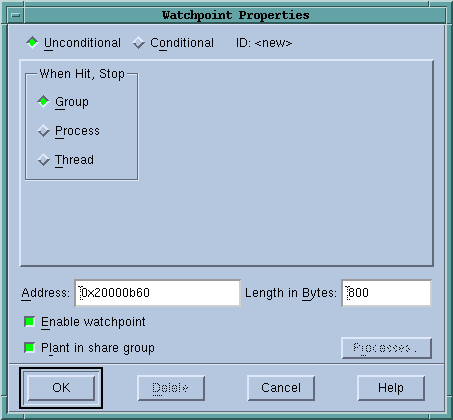Watchpoint Commands
Watchpoint type
Lets you indicate if the watchpoint is conditional or unconditional.
Unconditional
Tells TotalView to trigger the watchpoint whenever the memory location’s value is modified. You can tell TotalView that it should also stop the thread’s process or control group when the thread is stopped. Unconditional watchpoints are discussed below.
Conditional
Tells TotalView that, after a memory location is modified, it should evaluate the condition. Conditional watchpoints are discussed below.
Address
The first (or lowest) memory address to watch. Depending on the platform, this address may need to be aligned to a multiple of the Byte Size field. If you edit the address of an existing watchpoint, TotalView alters the watchpoint so it will watch this new memory location and reassigns the watchpoint’s action point ID.
Byte Size
The number of bytes that TotalView should watch. Normally, this amount is the size of the variable. However, some architectures limit the amount of memory that can be watched. In other cases, you may want TotalView to monitor a few locations in an array. For information on architectural limitations, see “
Platform Restrictions”.
Enable watchpoint
If selected, TotalView makes this watchpoint active. (If a watchpoint is inactive, TotalView ignores changes to the watched memory locations.)
Plant in share group
If selected, TotalView creates a watchpoint for each thread in the share group. Some architectures place limits on the size and number of watchpoints. See “
Platform Restrictions” for more information.

